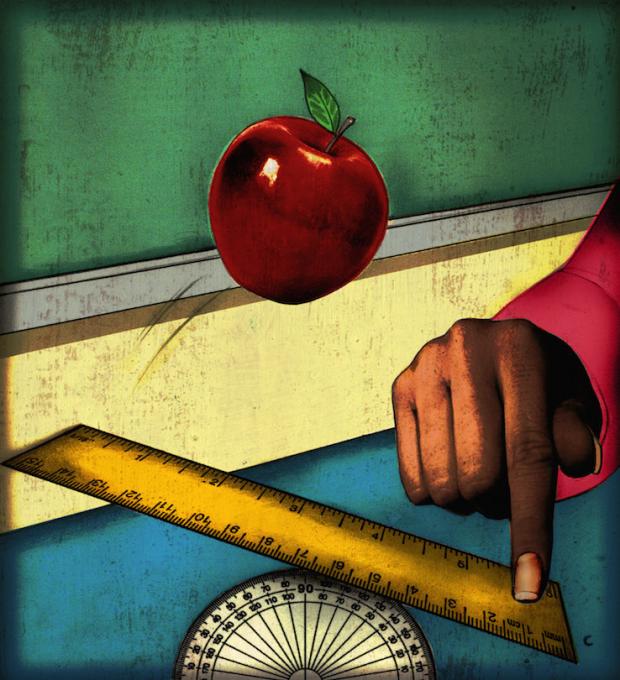
Teachers Aren’t the Villains
Standardized testing of pre-college students is, I think, a good idea—if the tests tell us what we really need to know. From what I’ve read, I’m not at all sure the current plan for tests do that. But they may, at some point, get that right. That is a matter of tuning.
If we had tests that accurately depicted students’ basic skills in such things as reading comprehension, writing ability, mathematical ability, and such, that could be a real help to both the students and their parents in knowing where things are, what help to seek (if help is needed), what opportunities to pursue, what things to complain about, and so forth.
Equally important, it would make sure that the schools, which have an interest in looking good, aren’t doing what amounts to self-evaluation and finding themselves wonderful and delightful in all regards. Not all schools do this, but some do. None should be allowed to do this. None.
But linking standardized testing to teacher evaluation is wrongheaded, stupid, and lazy. It makes no sense to anyone who works on the ground. Standardized tests tell us nothing about teacher competence, lack of competence, or teacher excellence.
Often, the very best and hardest-working teachers are in the worst-performing schools. Their kids don’t score well on the standardized tests, but the best of those teachers have had the most intense and humanly-draining relation to their work of anyone in the system.
What they do doesn’t show up in the scores. That’s because the scores are only a partial reflection of what teachers do and are able to do.
I’m an outsider in this: I’ve had children who have gone to Buffalo schools, but I have never taught in one. I’ve taught in one private and two public universities. UB mostly, and Indiana University, if you count the one year I taught composition there before going to Harvard. But a lot of my students and friends have taught in public schools, and we have talked, and continue to talk, about these things.
Students at Harvard were very easy to teach. Not only had they been rigorously cherry-picked before admission, but every one of them was surrounded by high-energy overachievers. You had to work hard to do badly. The air was full of getting-there.
In Buffalo city schools, how well students do depends very much on the same sort of thing. The charters, City Honors, and such, cherry-pick: the kids who enter those doors know they are on the city’s high road, and so do their teachers, and the teachers’ administrators, and all perform accordingly.
Of course those kids do well: we assume you are smart, invested and intelligent. We shall deal with you accordingly. (I know this from childhood experience: I went to Stuyvesant HS in Manhattan, one of the four New York City high schools you had to test into; our teachers had PhDs, our peers were scary; you couldn’t be lazy.)
What about a kid who hasn’t been cherry-picked, one who goes to one of the get-by schools and who is surrounded by get-by cohorts? What about a kid not lucky enough to have grown up in a household in which books and literacy were assumed, or English was not the native language? What about a kid who could read before entering first grade? What do the scores tell us about that? What do they tell us about the teachers working with those kids?
Nothing. Absolutely nothing.
Albany now seems to want to flatten it all out. All kids should graduate with certain skills. No problem there: from our social need and their personal need, that is a reasonable goal. You finish secondary school you should have certain basic skills.
But holding the teachers responsible for this flattening of social responsibility, care, and concern?
Bullshit. In all regards.
Teachers cannot be held accountable for those scores. Most of the public school teachers I know are people who really care about their students and what they are doing. The causes of broken families, unemployment, double-shifting, are not theirs and they are not the students’. The differential in some families providing households of high English literacy and others of trying to learn the language is not theirs either: It is only something they have to deal with, every day.
So testing is great—if it tells us what skills students do or do not have and if it allows parents and students to address what’s wrong. But blaming teachers for flunking scores on these tests is like blaming homicide victims for standing in the way of the bullets.
Teachers are not our bad guys. The problems are grounded in the social conditions that make the work of the most serious and dedicated of them nearly impossible.
You want a test that tells you what’s wrong? Devise one that goes to life in our community, and tells you how to fix what is wrong, not one that goes to what happens in the schoolrooms. Schoolrooms are where these issues are dealt with, not where they are caused.
Bruce Jackson has been a teacher for 53 years.
